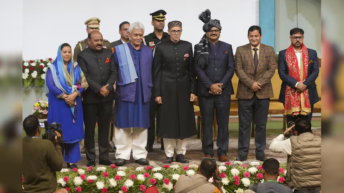|
Listen to article
Getting your Trinity Audio player ready...
|

India’s semiconductor manufacturing landscape is undergoing a significant transformation due to recent strategic investments and initiatives aimed at strengthening the country’s technological capabilities and economic resilience. These developments are landmarks in India’s journey toward self-reliance in semiconductor production, a critical asset in the digital age. The ‘Make in India’ campaign is fostering an environment conducive to indigenous semiconductor manufacturing capabilities.
The recent greenlighting of major semiconductor projects, such as those led by Tata Electronics Pvt Ltd and Foxconn in collaboration with the HCL Group, signals a shift in India’s approach to semiconductor manufacturing. These efforts indicate a resolve to reduce the existing reliance on imported chips and associated equipment. The Government funding, partnerships with global players, and the focus on advanced technologies like chip fabrication and packaging underline India’s commitment to technological innovation.
The establishment of these units is anticipated to create a substantial number of job opportunities, directly and indirectly, thus significantly impacting employment generation in advanced technology sectors. The ripple effects are expected to stimulate growth across various industries, from automotive to electronics and industrial manufacturing, catalyzing economic development and fostering a favorable environment for innovation and research.
Under the ‘Development of Semiconductors and Display Manufacturing Ecosystem’ initiative, the government is allocating up to Rs 76,000 crore in funding. Tata Electronics Pvt Ltd is collaborating with Taiwan’s Powerchip Semiconductor Manufacturing Corp to establish a semiconductor fab in Dholera, Gujarat. This facility is expected to have a monthly production capacity of 50,000 wafers, requiring an investment of Rs 91,000 crore. Additionally, Tata Semiconductor Assembly and Test Pvt Ltd (TSAT) will construct a semiconductor unit in Morigaon, Assam, with an investment of Rs 27,000 crore. The Assam unit is projected to manufacture 48 million chips daily, catering to various sectors such as automotive, electric vehicles, consumer electronics, telecom, and mobile phones. Lastly, the CG Power Semiconductor unit will focus on producing 15 million chips for applications in consumer electronics, industrial machinery, automotive systems, and power equipment.
The government recently greenlighted three significant semiconductor projects amounting to a total investment of Rs 1.26 lakh crore as part of the ‘Development of Semiconductors and Display Manufacturing Ecosystem’ initiative. One of the units, established by CG Power in partnership with Renesas Electronics Corp and Stars Microelectronics of Thailand, is set to be located in Sanand, Gujarat, with an investment of Rs 7,600 crore. Prime Minister Modi has emphasized that this endeavour is aimed at positioning India as a leading global hub in semiconductor production, instilling self-reliance in this crucial technological domain.
Semiconductors are crucial components in several technological applications, ranging from consumer electronics to industrial machinery. Countries such as the US, Japan, and China have prioritised the development of domestic semiconductor capabilities, in recognition of the strategic importance of this industry. Through this investment, India aims to increase its share of the global semiconductor market, forecasted to reach $63 billion in volume by 2026. The planned construction of semiconductor plants within the next hundred days highlights the government’s commitment to accelerating the development of indigenous high-performance computer chips and other semiconductor products with wide-ranging applications.
In keeping with the previously approved semiconductor manufacturing projects, Foxconn, a prominent electronics manufacturer from Taiwan, is reportedly seeking bids for the establishment of a semiconductor assembly and testing facility in India (OSAT). The proposed plant is anticipated to be set up in collaboration with the HCL Group, with an initial investment pledge of Rs 1,200 crore. Foxconn’s subsidiary, Foxconn Hon Hai Technology India Mega Development Pvt Ltd, is spearheading this effort and intends to invest $37.2 million to secure a 40 percent stake in the joint venture. This marks Foxconn’s entry into the Indian semiconductor landscape, following the termination of its previous agreement with the Vedanta Group. It’s worth noting that both Vedanta and Foxconn have announced separate plans to build chip fabs in India.
The establishment of four major semiconductor units in India is a significant step towards creating a robust semiconductor ecosystem within the country. These units will contribute to India’s capabilities in chip fabrication and the development of advanced packaging technologies, complementing the country’s existing strength in chip design. The creation of these units is expected to result in the creation of approximately 20,000 direct jobs focused on advanced technology, while also generating around 60,000 indirect employment opportunities. This development is likely to have a far-reaching impact on various industries, including downstream sectors such as automotive, electronics manufacturing, telecom, industrial manufacturing, and many other areas. Tata’s initiative will support the Indian Prime Minister’s ‘Make in India’ campaign for electronics manufacturing, bolstering India’s position as the world’s second-largest producer of smartphones.
Overall, these initiatives demonstrate the potential for India to take a leading place in semiconductor technology and foster domestic expertise in key technological fields.






Add comment